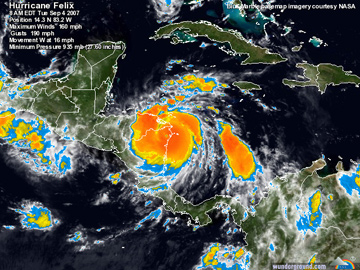Felix: first time two Category-5 storms hit land in same season
Felix: first time two Category-5 storms hit land in same season
mongabay.com
September 4, 2007
|
|
Hurricane Felix made landfall in Nicaragua around 7:45 a.m. Eastern Time as a Category 5 storm with top winds at 160 mph (260 km/h), according to the U.S. National Hurricane Center.
Coming just two weeks after Hurricane Dean hit Mexico’s Yucatan Peninsula, Felix is the second Category 5 storm to hit Central America this year. It is the first time on record that two Category 5 storms have made landfall in a single hurricane season, according to the U.S. National Oceanic and Atmospheric Administration. Hurricane Dean was the third most intense Atlantic hurricane to make landfall.
 Hurricane Felix. Image courtesy of wunderground.com |
A Category 5 hurricane is the strongest and most severe class of hurricane on the scale for measuring the strength of hurricanes. The scale, known as the Saffir-Simpson Hurricane Scale, classifies hurricanes by the intensity of their sustained winds, storm surge and flooding, developed in 1969 by civil engineer Herbert Saffir and National Hurricane Center director Bob Simpson. A Category 5 hurricane will have sustained winds of greater than 156 mph (250 km/h or 136 kt) and is capable of causing complete roof failure on residences and buildings.
Three Category 5 Hurricanes have made landfall in the United States since 1900.
By 11 a.m. ET, Felix had weakened to a Category 3 hurricane. To date there are no reports of fatalities though two fishing boats are missing off the coast of Nicaragua according to CNN, though there is heavy damage in the Nicaraguan town of Puerto Cabezas.
Scientists note that Felix has made landfall at an unusually low altitude for a Category 5 hurricane.
Related
Tree rings could settle global warming hurricane debate — 9/19/2006
Scientists have shown that ancient tree rings could help settle the debate as to whether hurricanes are strengthening in intensity due to global warming.
Global warming is causing stronger Atlantic hurricanes finds new study — 3/01/2007
Global warming is fueling stronger hurricanes according to a new Geophysical Research Letters study that revises that database of historic hurricanes. Previously the hurricane database was considered inconsistent for measuring the record of tropical storms since there have been significant improvements in the technology to measure storms since recording-keeping began. Before the development of weather satellites, scientists relied on ship reports and sailor logs to record storms. The advent of weather satellites in the 1960s improved monitoring, but records from newer technology have never been squared with older data. The new study “normalizes” the hurricane record since 1983.
Hurricane intensity linked to global warming — 8/15/2006
A new study says climate change is affecting the intensity of Atlantic hurricanes and that hurricane damage will likely worsen in coming years due to increasing ocean temperatures. Unlike recent studies that have linked higher sea temperatures to an increase in the number of hurricanes, the new research shows a direct relationship between climate change and hurricane intensity.
Global warming link to hurricanes challenged — 7/31/2006
Chris Landsea, a storm researcher at the National Hurricane Center, and colleagues argued in a paper published in the journal Science that improvements in technology now allow forecasters to produce more accurate estimates of a storm’s power, meaning that more hurricanes are now recognized as Category 4 and 5 storms than prior to the 1980s. They said that the storm databases used by researchers who found links between hurricanes and warmer sea temperatures contain inaccurate information.
Number of Category 4 and 5 hurricanes has nearly doubled over past 35 years — 9/16/2005
The number of Category 4 and 5 hurricanes worldwide has nearly doubled over the past 35 years, even though the total number of hurricanes has dropped since the 1990s, according to a study by researchers at the Georgia Institute of Technology and the National Center for Atmospheric Research (NCAR). The shift occurred as global sea surface temperatures have increased over the same period. The research appears in the September 16 issue of Science.